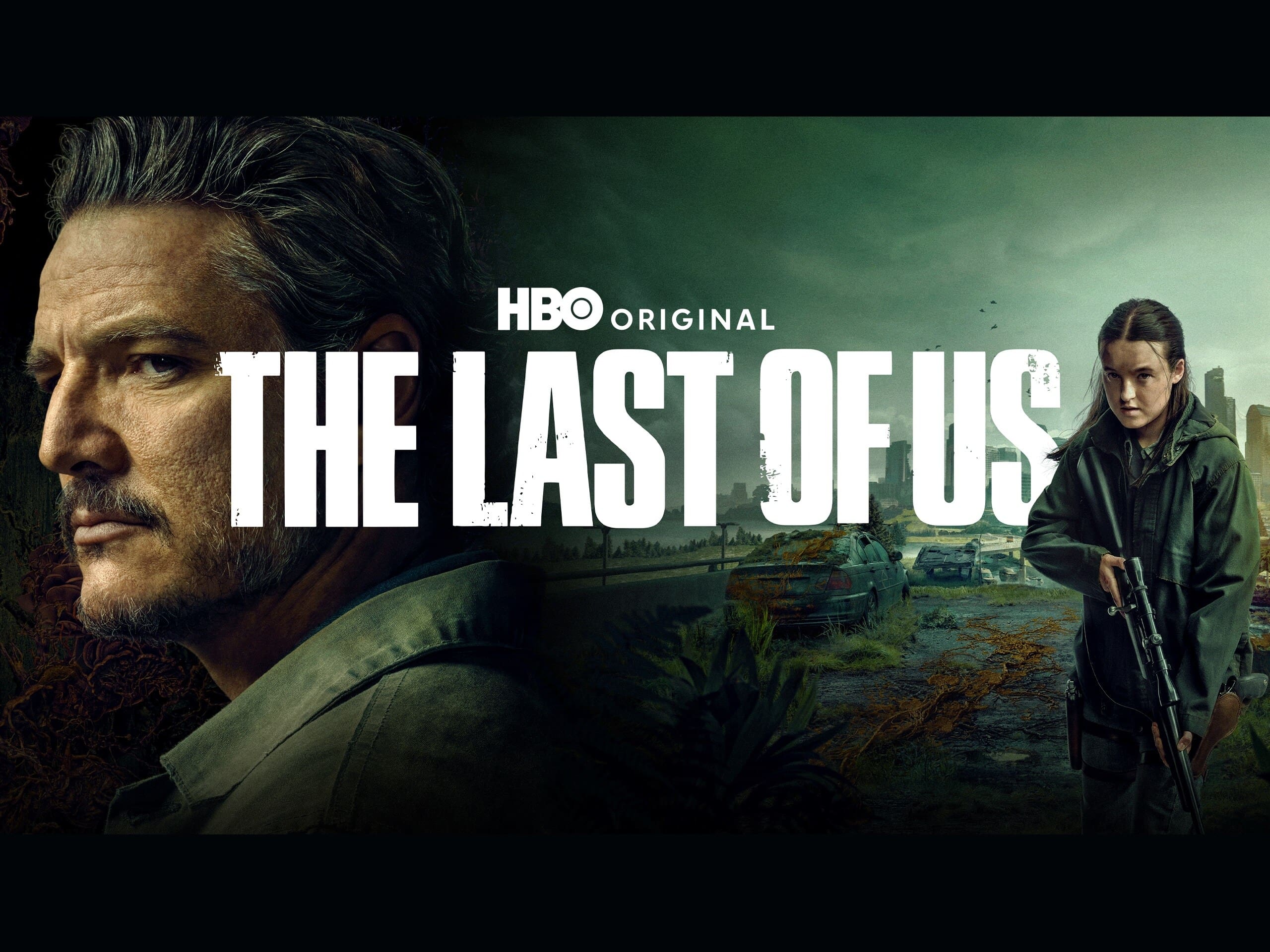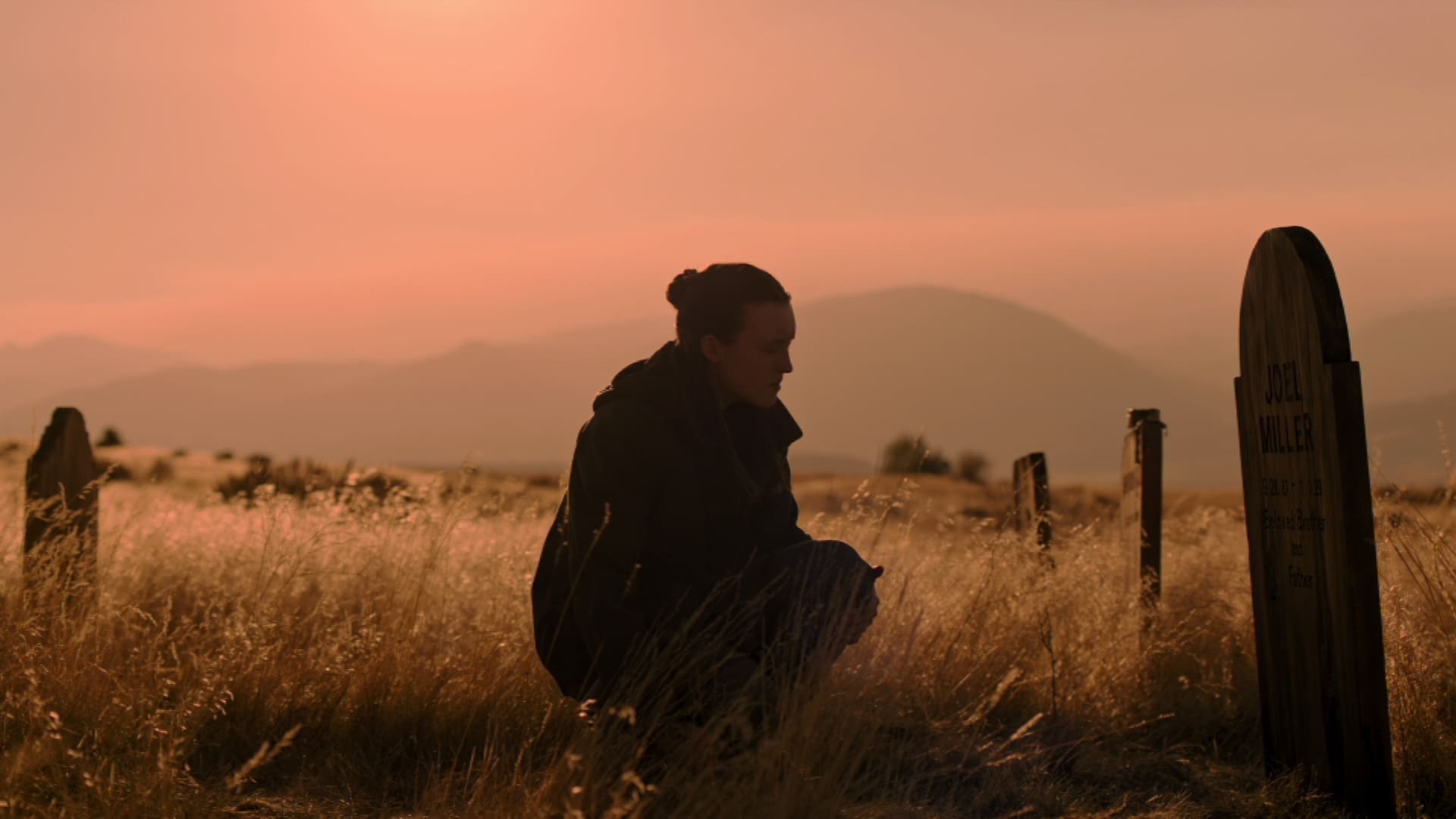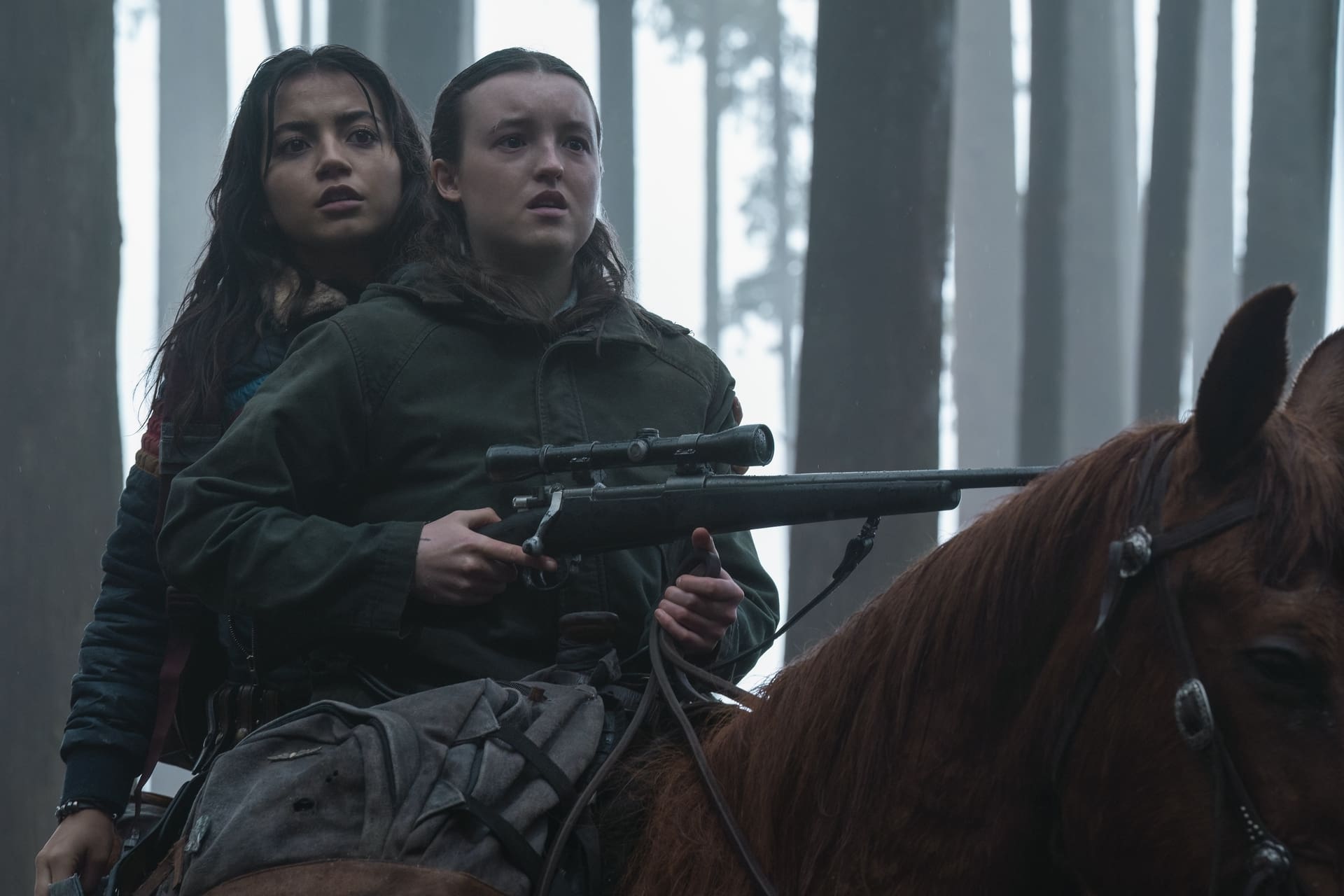
If there’s one narrative device that The Last Of Us as a franchise loves, it’s time jumps between traumatic incidents and new normals. These time jumps ask questions, and, in time, they let the story answer them. When the show and game cut from Joel holding his daughter’s body on Outbreak Day to 20 years later, the cut asks: how is Joel living? When the game cuts from Ellie desperately cleaning Joel’s wound after he was impaled, to Ellie hunting a rabbit some unsaid time in the future, the cut asks: is Joel living?
The opening of ‘The Path’ establishes the traumatic incident that will be the jumping off point. In a sky whose darkness is brought about by night and whose red is brought about by flames, the Hell reminiscent environment gives us a scene of Tommy (Gabriel Luna, Terminator: Dark Fate) in a make-shift morgue, briefly relieving the woman who was watching over the multitude of bodies covered by sheets, and of all of them, Tommy sits by one, tearfully telling him, “Give Sarah my love.” Tommy’s moment of grief is not him prioritizing Joel’s death over others. Rather, it’s a moment of rest. A moment to think about the time he had with his brother, to think about his brother finally seeing his niece again. Ellie (Bella Ramsey, Game of Thrones) on the other hand, wakes up in some makeshift hospital, and screams. Her mind is already revisiting Joel’s death, revisiting the sight of Abby (Kaitlyn Dever, Apple Cider Vinegar) stabbing his neck with a broken golf club. This is when the show cuts to three months later — cutting from a Tommy who reminisces about the time he had with Joel, and from an Ellie who can’t escape his death. So, this cut in “The Path” asks: how are they living without Joel?

During the three month gap, Ellie’s learned the right talking points so she can sarcastically dismiss Gail (Catherine O’Hara, Schitt’s Creek) — who, as it turns out, is the only therapist in all of Jackson, meaning she has to drink her problems away — because if Ellie’s sarcastically dismissive, then Ellie’s clearly back to her old self. This is true, Ellie is definitely back to her old self. That’s the problem. Her old self didn’t do the best job at confronting her emotions, so the fact that she’s functioning in the world of Jackson tells us only just that: she’s functioning. This is temporarily fine, but if, say, a dysfunctional alcoholic told you “Don’t worry guys, I’m working on being a functioning alcoholic,” you’d be rightfully concerned, and you should be just as concerned for Ellie, functioning or not.
‘The Path’ shows us Ellie’s inability to confront Joel’s death is not just about Joel, but loss as a whole. When Dina (Isabella Merced, Dora and the Lost City of Gold) brings up the ever so casual subject of “who’s the first person you killed,” Ellie responds, “Well the first one’s too fucked up, but I can tell you the second one.” The second kill occurred in the first season’s fourth episode, ‘Please Hold To My Hand,’ when Ellie shot some kid a little older than her who jumped Joel. However, while the show may end up giving us a different answer, it’s safe to assume that Ellie’s first kill was both her first romantic interest and her best friend: Riley (Storm Reid, A Wrinkle in Time), who was infected the same time Ellie was. If this assumption is correct, then we can infer that Ellie losing people she cares about is something she uniquely struggles with, no matter how many people she’s lost or killed.
Still, she’s not fooling anyone. There’s a town meeting, where a committee decides whether they can send a group of 16 to Seattle, to exact justice for Joel, though not before a select few can make their respective cases. This meeting is a compelling way of giving weight to Jackson as a community, as they all deal with their collective grief over not just Joel, but the town itself. It also does a better job of establishing Jackson as a community than the game. In the game, the scene that precedes Ellie and Dina embarking on their journey to Seattle (because of course they do) functions much differently dramatically, because in the game, it’s just an argument between Dina, Ellie, and Maria. Another character all three women care about* has run off to exact justice for Joel, and Maria is furious, terrified for their safety. ““You should have given us a group to go after those fuckers,” Ellie tells Maria in Part II. “Wish I could,” Maria callously responds. This is economic, effective writing. Maria obviously cares about Joel, she cares about Ellie, she cares about Jackson, and she cares about the dumbass that ran off. The world was on Maria’s shoulders, and Ellie’s dismissal of that hurts more than it should.
(*Who runs off in the game won’t be revealed here: they may eventually have a presence in Seattle, and if so, it’ll be a twist, so these lips are sealed.)
That said, as effective as the writing is in that scene in the game, both the attack on Jackson and the town meeting in the show give a tangibility to the safety of Jackson. After all, when the opening jumps ahead three months, it’s not just Ellie and Tommy that are recovering, but Jackson itself. A Jackson resident speaks at the meeting with great respect for Joel, and greater concern for Jackson itself. When the infected attacked Jackson, Tommy was among four men wielding flamethrowers to hold them off. Two of them run away, and another is killed. If those two men could have made a difference for Jackson, what difference could 16 make?
Ellie is the next speaker. At least, the next scheduled speaker. The town homophobe Seth (Robert John Burke, RoboCop 3), apparently crippled from the attack, rambles about justice, and doing the right thing for Joel, and all that. Maybe Seth is finally a decent guy. Maybe he’s just a bitter old asshole because he can’t bust a cap on some infected fools anymore, and he’s trying to rationalize his bloodlust. Seth’s presence in the game was limited to his homophobic encounter and questionable apology, so this is a new frontier for gamers, and a potentially exciting one.

Following this, in Ellie’s speech, she claims it’s not about her, or about Joel, but about “us,” whatever that means. As disingenuous as this speech was, it’s also as honest as she thinks she’s allowed to be. She thinks it’s about justice, she thinks it’s not about her or Joel, but that’s exactly what it’s about. It’s fitting, then, then we’re left in the dark about Ellie’s own understanding of what Joel did. Did she believe the lie that Joel swore by? Or, when Gail tells Ellie Joel’s last words in their session together were, “I saved her,” does Ellie know what Joel meant by that?
Consider Ellie’s inability to confront this, like going on a road trip with a flat tire. Yes, just as in the game, she and Dina travel to Seattle together, and they go about it optimistically. They see the decrepit towers and assume Abby’s group, the WLF, are smaller in scale, and so finding Abby shouldn’t be a problem. Neither of them are aware that the WLF aren’t just comfortable abiding in these decrepit remains. It’s to their benefit as they wage war. The two of them may have seen a group of slaughtered bodies, but they chalk it up to “Damn, can’t believe Abby would do something like this,” blissfully unaware that the WLF aren’t just the handful of people that killed Joel. They’re an army, and through this army, through this war, Ellie and Dina will confront a darkness that’s as embedded as the cordyceps, as violent as any cannibal they’ve fought, and with a blood lust that they, above all, have no trouble rationalizing.

